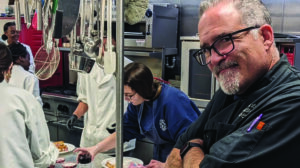Meet Diana Gawlik. She’s petite and beautiful, full of life and warmth. She radiates healthy enthusiasm. We call her “Di” at the Health Department. That’s because Di works as part of our team protecting the health of our community.I want to tell you about Di because she’s inspiring and knows well the risks of heart disease women face. Did you know heart disease is the No. 1 killer of women in America? That’s why we are working at the Health Department to provide and connect women with the medical screening tests and health care providers they need to reduce their risk – to save their own lives.Before I tell you about our efforts, let me tell you about Di. Like most women, Di has spent her life taking care of others and probably not good enough care of herself. She suffered much heartache in 2005, mourning both the deaths of her parents and her beloved husband of 10 years, Joe – all from heart disease-related causes.Between her family’s history of heart disease and the stress she was suffering, Di told me, “I had probably been building up to that heart attack for a year and a half.” She suffered her two heart attacks Aug. 28, 2005. She flatlined four times in the emergency department, three times on the way to surgery and four more times after a stent was placed in an artery in her heart that was 100 percent blocked. Di’s heart stopped beating for as long as 20 minutes. Her cardiologist gave her family little hope she would survive, much less recover.But recover she did. Di credits her doctors, her stubbornness and her desire to be here for her children and grandchildren. For this second chance at life, Di feels a responsibility to raise awareness and help other women prevent heart disease so they can live long, healthy lives.It’s for women like Di, the families who love them and our whole community’s health that we’ve embarked on a new grant-funded program to help women learn of their risk factors for heart disease and make necessary changes to improve their health. This approach to preventing, detecting and controlling heart disease is based on science and evidence of success in similar programs through the Centers for Disease Control and Prevention.Here’s what women who qualify can receive:
- Free screening tests such as blood pressure, blood sugar, cholesterol and BMI – a measure of body fat – all of which can be indicators of heart disease
- Health education and an individualized wellness plan
- Individualized meetings with a registered nurse case manager who helps women do self-assessments of eating and lifestyle habits and define goals for improvement
- Referrals to health care providers for medical attention






